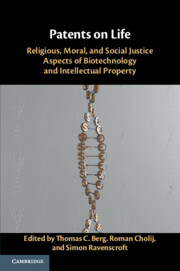 Patents on Life
Patents on Life from III - Social Justice and Political Aspects
Published online by Cambridge University Press: 28 September 2019
While US patent law remains agnostic regarding morality issues, in Europe the patentability of processes for modifying the germline genetic identity of human beings is prohibited on moral grounds. The question is whether this provision will soon be open to interpretation as CRISPR, a new gene editing tool, means pressure may come to rethink the contour of legal concepts in light of beneficial applications. The chapter argues for banning patents claiming processes modifying the germline genetic identity of human on the basis of social justice considerations. I argue in particular that germline modification techniques will be too costly for public health systems to afford. Other technologies such as PGD give future parents the possibility to choose healthy embryos, and the preference for a genetically-related child will be dismissed if the modification is too expensive, as public health systems face difficult resource-allocation dilemmas. It will be unacceptable to allow patents if the inventions will only benefit well-to-do classes and create a system of competition between private clinics for costly therapies and services, including potentially off-label use of relevant technologies. The piece concludes with alternative possibilities for funding innovation as solutions to the problems described in the chapter.
To save this book to your Kindle, first ensure no-reply@cambridge.org is added to your Approved Personal Document E-mail List under your Personal Document Settings on the Manage Your Content and Devices page of your Amazon account. Then enter the ‘name’ part of your Kindle email address below. Find out more about saving to your Kindle.
Note you can select to save to either the @free.kindle.com or @kindle.com variations. ‘@free.kindle.com’ emails are free but can only be saved to your device when it is connected to wi-fi. ‘@kindle.com’ emails can be delivered even when you are not connected to wi-fi, but note that service fees apply.
Find out more about the Kindle Personal Document Service.
To save content items to your account, please confirm that you agree to abide by our usage policies. If this is the first time you use this feature, you will be asked to authorise Cambridge Core to connect with your account. Find out more about saving content to Dropbox.
To save content items to your account, please confirm that you agree to abide by our usage policies. If this is the first time you use this feature, you will be asked to authorise Cambridge Core to connect with your account. Find out more about saving content to Google Drive.